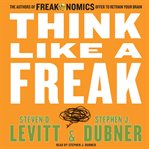Quit The power of knowing when to walk away
Book - 2022
"From the bestselling author of Thinking in Bets comes a toolkit for mastering the skill of quitting to achieve greater success. Business leaders, with millions of dollars down the drain, struggle to abandon a new app or product that just isn't working. Governments, caught in a hopeless conflict, believe that the next tactic will finally be the one that wins the war. And in our own lives, we persist in relationships or careers that no longer serve us. Why? According to Annie Duke, in the face of tough decisions, we're terrible quitters. And that is significantly holding us back. In "Quit," Duke teaches you how to get good at quitting. Drawing on stories from elite athletes like Mount Everest climbers, founders of le...ading companies like Stewart Butterfield, the CEO of Slack, and top entertainers like Dave Chappelle, Duke explains why quitting is integral to success, as well as strategies for determining when to hold em, and when to fold em, that will save you time, energy, and money. You'll learn: How the paradox of quitting influences decision making (If you quit on time, you will feel you quit early); What forces work against good quitting behavior, such as escalation commitment, desire for certainty, and status quo bias; How to think in expected value in order to make better decisions, as well as other best practices, such as increasing flexibility in goal-setting, establishing "quitting contracts," anticipating optionality, and conducting premortems and backcasts. Whether you're facing a make-or-break business decision or life-altering personal choice, mastering the skill of quitting will help you make the best next move." --
- Subjects
- Genres
- Self-help publications
- Published
-
[New York, NY] :
Portfolio/Penguin
[2022]
- Language
- English
- Main Author
- Item Description
- Place of publication from publisher's website.
- Physical Description
- xxvi, 308 pages : illustrations ; 22 cm
- Bibliography
- Includes bibliographical references (pages 281-296) and index.
- ISBN
- 9780593422991
- Prologue The Gaffed Scale
- Grit vs. Quit
- Wrapped in Euphemism
- Science Says
- Section I. The Case for Quitting
- Chapter 1. The Opposite of a Great Virtue Is Also a Great Virtue
- The Invisible Men at the Top of the World
- Quitting Is a Decision-Making Tool
- The Siren Song of Certainty
- The Super Bowl Is a Corporate Graveyard
- "Know When to Hold 'Em, Know When to Fold 'Em But Mostly, Fold 'Em
- Chapter 2. Quitting On Time Usually Feels Like Quitting Too Early
- Quit While You Still Have a Choice
- Thinking in Expected Value
- Quitting Decisions Are Expected-Value Decisions
- Time Travelers from the Past
- Flipping Coins
- Jumping the Shark
- The Quitting Bind
- Chapter 3. Should I Stay, or Should I Go?
- Paper Gains and Paper Losses
- Quit While You're Ahead?
- Take the Money and Run
- How Smart Is the Smart Money?
- Getting Feedback on the Things You Don't Do
- Interlude I. Quitting When the World is Watching
- Section II. In the Losses
- Chapter 4. Escalating Commitment
- Knee-Deep in the Big Muddy
- Waiting until It Hurts
- Chapter 5. Sunk Cost and the Fear of Waste
- The Sunk Cost Effect
- When "Public Works" Is an Oxymoron
- Katamari
- How Big Does the Katamari Grow?
- Mental Accounting
- The Hardest Cost to Bear
- The Difference between Knowing and Doing
- You Can't Jedi Mind Trick Being Fresh to a Decision
- Chapter 6. Monkeys and Pedestals
- Getting the Monkey Off Your Back
- Kill Criteria
- Funnel Vision
- States and Dates
- Better, Not Perfect
- Interlude II. Gold or Nothing
- Section III. Identity and Other Impediments
- Chapter 7. You Own What You've Bought and What You've Thought: Endowment and Status Quo Bias
- An Oenophile among Economists
- Also, If You've Known It, You Own It
- The Endowment Effect
- Pro Sports Teams and Their Escalating Commitment to High Draft Picks
- The Status Quo Is Hard to Quit
- Better the Devil You Know
- The Price of Sticking
- Chapter 8. The Hardest Thing to Quit Is Who You Are: Identity and Dissonance
- The Cult of Identity
- Cognitive Dissonance
- The Mirror and the Window
- Out on a Limb
- Mistaken Identity
- A Ray of Hope
- Chapter 9. Find Someone Who Loves You but Doesn't Care about Hurt Feelings
- (Over) Optimism
- The Difference between Being Nice and Being Kind
- Some Coaches Can Pull the Plug
- Divide and Conquer
- The Importance of Giving and Getting Permission
- Interlude III. The Ants go Marching ... Mostly
- Section IV. Opportunity Cost
- Chapter 10. Lessons from Forced Quitting
- In the Meantime
- What Ants Can Teach Us about Backup Plans
- Notes from the London Underground
- Just One Day
- Diversifying Your Opportunities
- The Great Resignation
- Chapter 11. The Myopia of Goals
- The Problem with Pass-Fail
- Fixed Objects in a Changing World
- Every Goal Needs At Least One Unless
- Marking Progress along the Way
- Goal-Induced Myopia
- Quit Thinking about Waste
- Acknowledgments
- Notes
- Bibliography
- Index
Review by Kirkus Book Review

